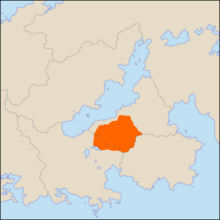Lusatians (Ajax): Difference between revisions
No edit summary |
No edit summary |
||
| Line 4: | Line 4: | ||
| group = Lusatian | | group = Lusatian | ||
| image = Lestek.PNG | | image = Lestek.PNG | ||
| image_upright = 0.6 | |||
| image_caption = A Lusatian Knight during the [[Alban Crusade]] | | image_caption = A Lusatian Knight during the [[Alban Crusade]] | ||
| total = | | total = | ||
Revision as of 09:55, 15 July 2022
This article is incomplete because it is pending further input from participants, or it is a work-in-progress by one author. Please comment on this article's talk page to share your input, comments and questions. Note: To contribute to this article, you may need to seek help from the author(s) of this page. |
 A Lusatian Knight during the Alban Crusade | |
| Regions with significant populations | |
|---|---|
| 500,000 | |
| 30,000 | |
| Languages | |
| Ostro-Ludzic and Gariman | |
| Religion | |
| Fabrian Christianity Emendatic Nazarism | |
The Lusatians are a Slavic population inhabiting the modern Duchy of Lusatia in Garima even if an important diaspora exist in all countries surrounding Lake Kulpanitsa. Despite their genetic proximity to the Ludzand Biele, they are not speakers of the the Ostro-Ludzic language, even if the current Lusatian language is hypothetized by linguist to be the last still-spoken representent of the Vestrozavian dialects. The reason behind this exclusion of the Ostro-Ludzic spectrum is the isolation known by the Lusatians, in the landlocked and distant eastern fringes of Garima, compared to the rest of the slavic populations of the Kulpanitsan lake, who maintained important contacts and exchanges thourough the ages.
History
Pre-Lushyodorstag
It is difficult to trace back the roots of the Lusatians people precisely as there is a scarcity in ressources from either Tervingia or its successor-states talking in details about the Slavic people. In most situations, they are referred to only as "The Slavs", with little care or knowledge about their tribal distinctions.
The first mention of the Slavs from Morinia come from one of the titles its first king gave himself on his coinage: "Victorious over the Multitude". Contemporary chronicles also mention that Chorcus Warhand allowed its Slavic ennemies to settle in the Furodomark where they became tributary of the Morinian State. It is commonly admitted that its from these populations who failed to invade Morinia and were forced to settle in the Highlands that the ancestors of the modern Lusatians would emerge. Since the 19th century, it has become common to refer to these ancestors as "Vestrozavans" but any contemporary demonym they could've had has been lost to the ages.
A century later, documents speak of the "Suedian Slavs" who lived on he eastern and northern shores of the modern "Gariman Lakes", on the border between Morinia and Suedia. They seemed to have been mostly loyal to the former, meaning that they might be Vestrozavan tribes who were resettled there by the successors of Chorcus Warhand to serve as buffers between Morinia and its southern rival.
Under the Lushyodorstag
Almost all of the lands occupied by Vestrozavian slavs fell under the hegemony of the Lushyod during the 9th century, and were later integrated into the Lushyodorstag.
Aulic Empire
During the 11th century, revolts by the Emendatic Monasteries, the true seats of power in the Vestrozavan dominant regions, became more and more common. It's during such an event that the Holy Aulic Empire, sent troops to liberate the populations from the Lushyods. Well received by the Monks, they manage to carve out the Duchy of Lusatia from the Lushyodorstag but couldn't go deeper in the mountaineous highlands. It's only then that the name "Lusatia" is mentioned for the first time and that the story of the Lusatians officialy begin.
